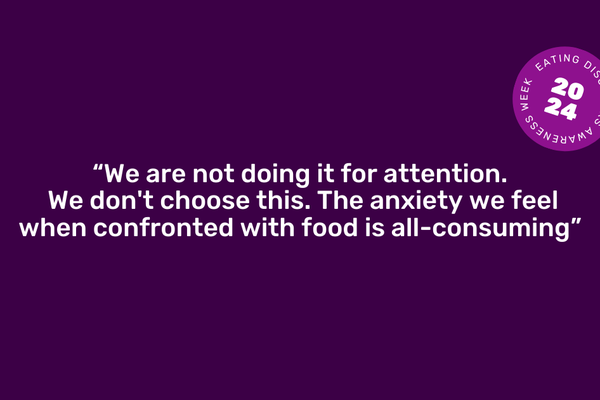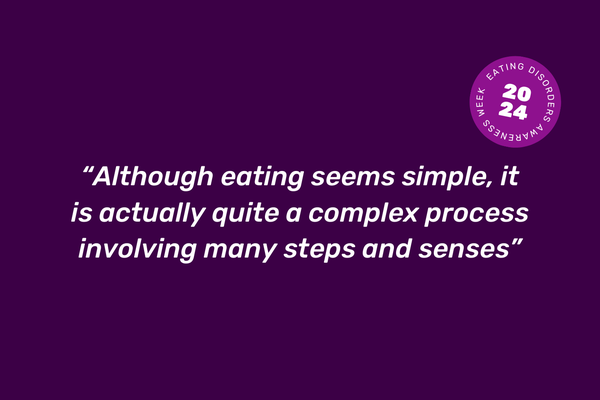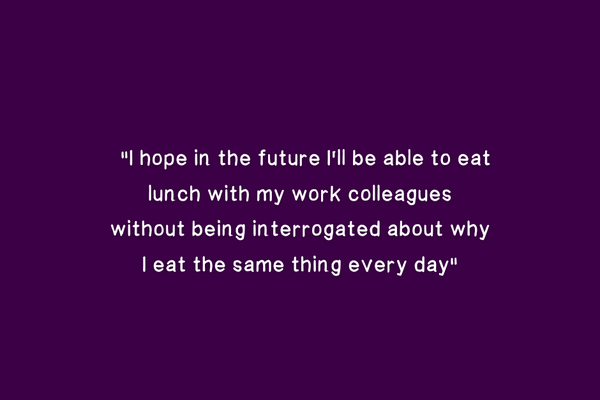I didn’t realise I even had an eating disorder until I discovered the ARFID page on Beat’s website. I’d felt so scared of food for a long time and yet, because I wasn’t worried about my weight, neither me nor anyone else could pinpoint why I had felt like this. It had been suggested I had PTSD or OCD, but nothing quite explained the way I felt about food. When I finally found out about ARFID, you might think a diagnosis would’ve scared me more. But the truth is, I had a name for what I was feeling, and I found out that it’s actually really common.
My eating disorder means that I’m scared of eating in case I’m ill and doesn’t relate at all to my body image physically. It was really hard when I had this diagnosis (later by a professional too) but at least with my diagnosis I could now put it into words and share my experiences with people in my family.
I later started going to self-help groups and then to counselling where I was encouraged to talk about the specifics of my eating disorder. The worries I'd had - about who I felt like I couldn't tell or talk about - eventually left, and I felt comfortable enough to speak to who I was close with about my eating disorder.
I’ve been living with ARFID for about 3-ish years now and it has sometimes felt like a barrier in front of me. I also struggle with depression so when I have a bad day with one, the other tends to get worse too. However, the biggest thing that helped me was telling other people. They had questions about why it worried me of course, but mostly they just wanted to know how to help. I have an amazing best friend who is very respectful of my anxieties and a boyfriend who is equally understanding and encouraging. All the people around me have helped me realise that speaking out is what’s best; people aren’t mind readers!
Living with an eating disorder is really tough. It makes everyday harder and over-thinking comes into play at all times. I’m still in the process of recovering and whilst I’m so thankful for everyone who has helped me over the years, I also want to say well done to me 😊.
I remember feeling as though I would never recover, and that this was something that just meant I would be held back from loads of things permanently…Two years later and I’ve passed my driving test and been at university for over a year! I even plucked up the courage to get a tattoo!
If you’re currently recovering from an eating disorder, you should say well done to you as well! Every step forward to recover feels like it is doing the opposite, but over time you’ll find that things start to give and you’ll be able to look back and see just how well YOU have done.
Contributed by Frankie
“You are more than your eating disorder” – What do people affected by ARFID wish we knew?
22 February 2024We asked people affected by ARFID what they would like others to know about the often misunderstood condition.
“Eating is actually quite a complex process” - dietitians Sarah Fuller and Clare Ellison on ARFID vs 'picky eating'
19 February 2024Advanced eating disorder dietitians Sarah Fuller and Clare Ellison discuss the difference between ARFID and 'picky eating'.
"ARFID and me" - Chloe's story
26 September 2023Our supporter Chloe shares her experience of living with ARFID, and her hopes for better understanding of the eating disorder


